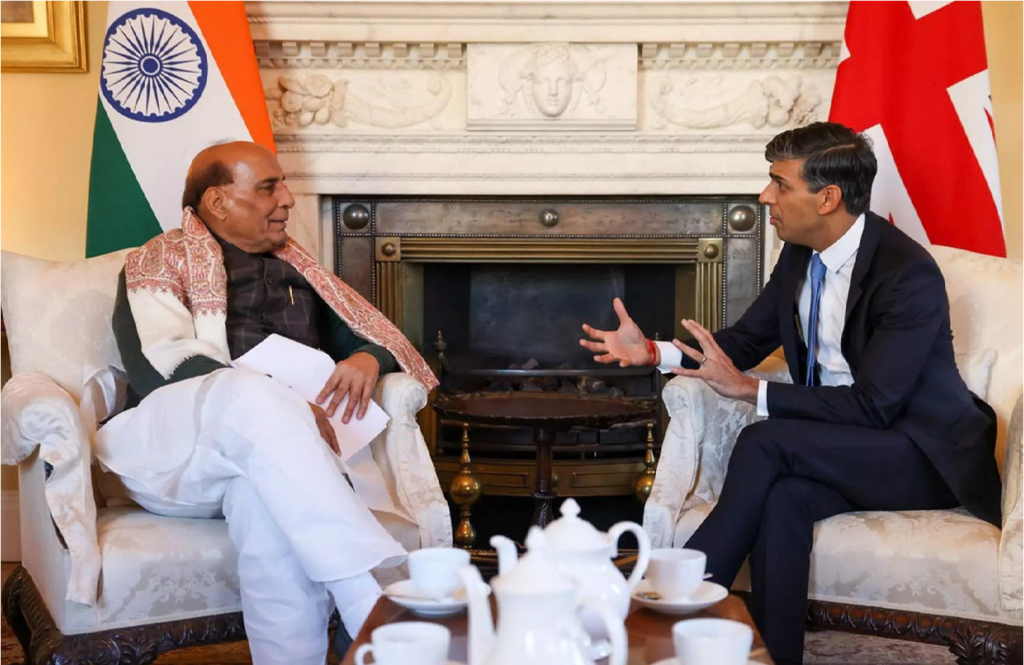
- Rajnath Singh’s visit to the UK was more than a diplomatic exercise; it was a testament to the depth and diversity characterizing India-UK relations.
- Encompassing domains as varied as defence, economic cooperation, and strategic partnerships, the trip exemplified a shared commitment to a rule-based international order and reciprocal growth.
Indian Defence Minister Rajnath Singh recently concluded a diplomatic mission to the United Kingdom, marking a pivotal moment in the ongoing efforts to strengthen ties between the two nations. The visit was highlighted by a series of high-profile meetings, including a significant encounter with British Prime Minister Rishi Sunak.
The discussions between Singh and Sunak covered a broad spectrum of topics, showcasing the commitment to enhancing both bilateral defence initiatives and economic collaborations. A notable aspect of their meeting was Singh’s presentation of a symbolic gift—a Ram Darbar statue—an embodiment of cultural exchange and mutual understanding. The presence of UK National Security Adviser Sir Tim Barrow added strategic weight to the deliberations.
Delving into the nuanced aspects of their talks, the Indian Ministry of Defence’s official communication underscored Sunak’s alignment with the imperative need for collaborative efforts between the UK and India. The ongoing free trade agreement (FTA) negotiations, presently in their 14th round, hold immense promise for significantly amplifying the existing annual partnership, already estimated at around GBP 36 billion.
Sunak, in articulating his government’s unwavering commitment, expressed a keen interest in bolstering the defence and security dimensions of the bilateral relationship. This encompassed a proactive stance on supporting robust business partnerships and fostering technological collaborations with Indian counterparts. In turn, Singh shared insights into his positive interactions with the UK defence industry, marking a rejuvenation in the bilateral defence ties—significant as the first visit by an Indian Defence Minister in 22 years.
Moving beyond the formalities of official meetings, Singh actively engaged with the Indian community in the UK. Addressing a gathering of nearly 200 individuals, he provided a compelling narrative of India’s trajectory, foreseeing its economic preeminence by 2075-2080. This outreach not only solidified connections with the diaspora but also projected India’s growth narrative on a global stage.
The visit transcended routine diplomatic affairs, with Singh co-chairing a consequential UK-India Defence Industry CEOs Roundtable alongside UK Defence Secretary Grant Shapps. The outcome included agreements on the conduct of a bilateral international cadet exchange programme and collaborative endeavours in defence research and development between India’s Defence Research and Development Organisation (DRDO) and the UK’s Defence Science and Technology Laboratory (DSTL).
In summation, Rajnath Singh’s visit to the UK was more than a diplomatic exercise; it was a testament to the depth and diversity characterizing India-UK relations. Encompassing domains as varied as defence, economic cooperation, and strategic partnerships, the trip exemplified a shared commitment to a rule-based international order and reciprocal growth, reaffirming the robust ties between these two nations. As the global geopolitical landscape continues to evolve, such interactions become pivotal in shaping the future trajectory of bilateral relations and fostering mutual understanding on the world stage.
(The author is a postgraduate student in International Relations at Amity University, Raipur. He writes articles and research papers regularly on international affairs and geopolitics.)
